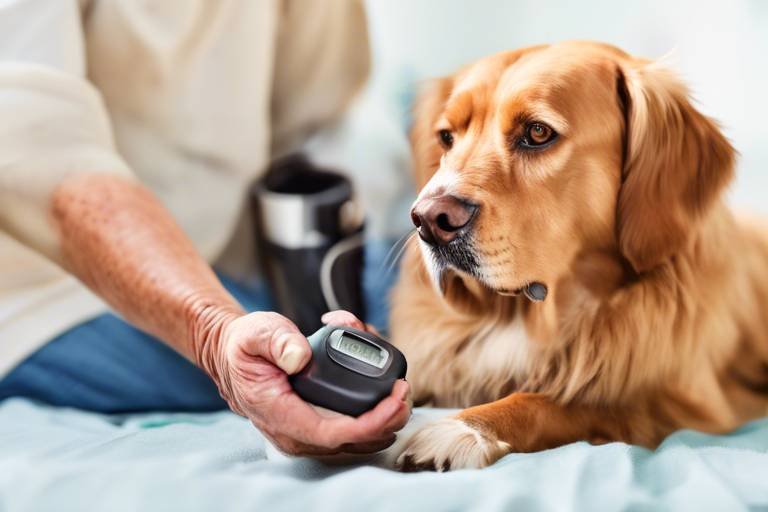The Importance of Regular Heartworm Testing in Older Pets
As our beloved pets age, their health becomes a top priority for us as pet owners. One of the most critical aspects of maintaining their well-being is ensuring they are tested regularly for heartworm disease. Heartworm disease is not just a minor concern; it can be life-threatening, especially for older pets whose immune systems may not be as robust as they once were. Imagine your furry companion, once full of energy, now facing a hidden threat that could lead to serious health complications. This is why understanding the significance of regular heartworm testing is essential.
Heartworm disease is caused by parasitic worms that reside in the heart and lungs of infected pets. The transmission occurs through mosquito bites, making it a risk in many environments. For older pets, the stakes are even higher. With age, their bodies may struggle to cope with infections, and the consequences of heartworm disease can escalate quickly. Regular testing not only helps in early detection but also plays a pivotal role in ensuring that your pet receives timely treatment if needed.
So, what can pet owners do to safeguard their older pets? Regular heartworm testing is a proactive step that can make all the difference. By scheduling annual tests, you can stay ahead of potential health issues. It's like taking your car for a check-up to prevent breakdowns; the same principle applies to your pet's health. The earlier any heartworm infection is detected, the better the chances of effective treatment and recovery.
Furthermore, regular testing allows veterinarians to tailor preventive measures specifically for your pet's needs. This personalized approach can include recommendations for monthly preventatives, which are crucial in keeping heartworm at bay. Just like we take vitamins to boost our immune system, these preventatives act as a shield for our pets. Remember, an ounce of prevention is worth a pound of cure, especially when it comes to heartworm disease.
In conclusion, the importance of regular heartworm testing in older pets cannot be overstated. It is a simple yet effective way to ensure your furry friends live long, healthy lives. By being proactive and vigilant, you can help protect your pets from the dangers of heartworm disease. After all, they give us unconditional love and companionship; it’s only fair we return the favor by keeping them safe and healthy.
- How often should my older pet be tested for heartworms?
Veterinarians typically recommend annual heartworm testing for older pets, regardless of preventive measures.
- What are the symptoms of heartworm disease in older pets?
Symptoms can include coughing, fatigue, weight loss, and behavioral changes such as decreased activity.
- Can heartworm disease be treated?
Yes, heartworm disease can be treated, but early detection is crucial for effective treatment.
- What preventive measures are available for heartworm?
Monthly preventatives, regular testing, and routine veterinary check-ups are essential in preventing heartworm disease.

Understanding Heartworm Disease
Heartworm disease is a potentially life-threatening condition that affects pets, particularly dogs and cats. It is caused by a parasite known as Dirofilaria immitis, which is transmitted through mosquito bites. Once inside the host, these parasites can grow up to a foot long and live in the heart, lungs, and associated blood vessels, leading to serious health complications. The disease is particularly insidious because it often develops silently, with pets showing few, if any, symptoms in the early stages.
Understanding how heartworm disease spreads is crucial for pet owners. The lifecycle of the heartworm begins when a mosquito bites an infected animal and ingests microfilariae, the immature form of the heartworm. When that mosquito bites another pet, it can transmit the larvae into the new host. The larvae then migrate through the pet's body and mature into adult heartworms within six months. Once matured, they can reproduce and continue the cycle. The risk of infection is highest in regions with warmer climates, particularly during the summer months when mosquitoes are most active.
Heartworm disease can lead to severe complications if left untreated. The presence of adult worms in the heart can cause significant damage, leading to conditions such as congestive heart failure or even death. Symptoms may not appear until the disease is advanced, making regular testing even more critical for older pets, who may already have compromised health.
In addition to understanding the transmission, it's important to recognize the effects of heartworm disease on your pet's health. The following table outlines some of the potential complications associated with heartworm infection:
| Complication | Description |
|---|---|
| Heart Failure | Heartworms can cause the heart to become enlarged and weakened, leading to heart failure. |
| Lung Disease | As worms inhabit the lungs, they can cause inflammation and respiratory issues. |
| Thromboembolism | Worms can cause clots that may block blood vessels, leading to severe complications. |
| Sudden Death | In severe cases, the presence of heartworms can lead to sudden death, particularly in heavily infected pets. |
To sum it up, understanding heartworm disease is about more than just knowing the basics; it’s about recognizing the seriousness of the condition and the importance of prevention and early detection. By keeping your older pets safe from this dangerous parasite, you can help ensure they live a long and healthy life. Regular heartworm testing, especially in senior pets, is a vital step in safeguarding their health.

Why Older Pets Are at Greater Risk
As our beloved furry friends age, they become more vulnerable to a variety of health issues, and heartworm disease is no exception. One of the primary reasons older pets face a higher risk of heartworm infection is their weakened immune systems. Just like humans, pets experience a decline in their immune function as they grow older, making it harder for their bodies to fend off parasites like heartworms. These parasites can wreak havoc in their hearts and lungs, leading to severe health complications.
Moreover, many older pets often have pre-existing health conditions that can complicate their overall health status. Conditions such as kidney disease, diabetes, or arthritis can not only lower their immune response but also make it difficult for them to tolerate the effects of heartworm disease. This interplay of aging and existing health issues creates a perfect storm, increasing the likelihood of infection and complicating treatment options.
Additionally, older pets may not exhibit the same energy levels as their younger counterparts, leading to a more sedentary lifestyle. A lack of physical activity can contribute to weight gain and overall poor health, which can further weaken their immune systems. This decline in vitality can also mask the symptoms of heartworm disease, making it harder for pet owners to recognize when something is wrong. It's crucial for pet owners to be vigilant and observant, as the signs of heartworm infection can be subtle.
To better understand the factors contributing to the increased risk of heartworm disease in older pets, consider the following:
- Immune System Decline: Aging leads to a less effective immune response.
- Chronic Health Issues: Pre-existing conditions can complicate health and treatment.
- Reduced Activity Levels: A sedentary lifestyle can mask symptoms and contribute to weight gain.
- Increased Exposure: Older pets may have lived in environments with higher mosquito populations, increasing their risk.
Understanding these factors is essential for pet owners. By recognizing the vulnerabilities that come with age, you can take proactive steps to safeguard your furry companion's health. Regular veterinary visits are crucial for monitoring their overall well-being and ensuring they receive timely heartworm testing and preventative care. Remember, an ounce of prevention is worth a pound of cure!
Symptoms of Heartworm in Older Pets
When it comes to heartworm disease, older pets often show symptoms that can be easily overlooked. Unlike younger animals, who may display more pronounced signs, senior pets might exhibit subtle changes that can leave pet owners scratching their heads. It's crucial to be aware of these signs, as early detection can significantly influence treatment outcomes.
One of the most common symptoms to watch for is coughing. This isn’t just a simple cough; it can be persistent and may occur during activities that were once easy for your pet. Coupled with this, you might notice your furry friend becoming more fatigued than usual. If your once-energetic dog is now opting for a nap instead of a game of fetch, it might be time to pay attention. Weight loss can also be a red flag. If your pet is eating normally but still losing weight, this could indicate that something is amiss.
Additionally, keep an eye out for behavioral changes. Older pets may become less active, showing a reluctance to engage in their favorite activities. This can manifest in various ways, such as:
- Refusing to go for walks
- Not playing with toys
- Hesitating to climb stairs or jump onto furniture
Physical signs can also be alarming. If you notice your pet struggling to breathe or exhibiting a swollen abdomen, these symptoms could indicate advanced heartworm disease. Such signs necessitate immediate veterinary attention. Remember, the earlier you catch these symptoms, the better the chances of effective treatment.
In summary, being vigilant about your older pet's health can make a world of difference. Regular check-ups and awareness of these symptoms can help you stay ahead of heartworm disease, ensuring your beloved pet remains happy and healthy.
Q: How often should I have my older pet tested for heartworm?
A: Veterinarians typically recommend annual heartworm testing for older pets, regardless of whether they are on preventive medication.
Q: What should I do if I notice symptoms of heartworm in my pet?
A: If you observe any symptoms such as coughing, fatigue, or weight loss, consult your veterinarian immediately for testing and potential treatment options.
Q: Can heartworm disease be treated?
A: Yes, heartworm disease can be treated, especially if caught early. Treatment usually involves medication to kill the adult worms and may require hospitalization.
Q: Is heartworm preventable?
A: Absolutely! Regular heartworm preventatives and annual testing can significantly reduce the risk of heartworm disease in pets.
Behavioral Changes to Watch For
When it comes to our beloved older pets, their behavior can often be the first indicator that something is amiss. As pet owners, we need to be particularly vigilant about any behavioral changes that may signal the onset of heartworm disease. It's not just about the obvious signs; sometimes, the subtleties can be alarming. For instance, if your furry friend who once eagerly bounded towards the door at the sound of a leash now lingers behind, it could be a red flag. This reluctance to exercise or engage in activities they once loved can stem from fatigue caused by heartworm infection.
Additionally, you might notice a decrease in your pet's overall enthusiasm for playtime or walks. This is not just a sign of aging; it can indicate that their body is struggling to cope with the strain heartworms place on their cardiovascular system. A once playful pup might become a couch potato, and a senior cat may find comfort in solitude rather than exploring their surroundings. Keeping an eye on these changes is crucial, as they can often lead to earlier diagnosis and treatment.
Another behavioral change to monitor is alterations in sleeping patterns. If your pet seems to be sleeping more than usual or appears restless during sleep, it could be a sign that they are not feeling well. In some cases, heartworm disease can cause discomfort that disrupts their rest. Being attentive to these shifts in behavior can help you catch potential health issues before they escalate.
To sum it up, here are some key behavioral changes to watch for:
- Decreased Activity: Less enthusiasm for walks or playtime.
- Increased Fatigue: More time spent resting or sleeping.
- Reluctance to Exercise: Hesitation when it comes to physical activities.
- Changes in Sleeping Patterns: More restless or prolonged sleep.
By staying observant and recognizing these signs early, you can take proactive steps to consult your veterinarian. Remember, your older pet relies on you to notice these changes, so keep an eye out for any unusual behaviors. It could make all the difference in their health and happiness.
- How often should I have my older pet tested for heartworms?
It's generally recommended to have older pets tested annually, regardless of whether they are on preventive medication. - What are the common symptoms of heartworm disease?
Symptoms can include coughing, fatigue, weight loss, and behavioral changes such as decreased activity. - Can heartworm disease be treated in older pets?
Yes, heartworm disease can be treated, but the success of treatment often depends on how advanced the disease is. - Is heartworm prevention necessary if my pet has been tested negative?
Yes, prevention is crucial to protect your pet from future infections, even if they tested negative in the past.
Physical Signs of Infection
When it comes to heartworm disease in older pets, being vigilant about can make all the difference. Many pet owners may not realize that the symptoms can be quite subtle at first, gradually worsening as the disease progresses. One of the most alarming signs is labored breathing. If you notice your furry friend struggling to catch their breath, it’s a clear indication that something is wrong. This difficulty can stem from the heart and lungs being affected by the parasites, causing distress and discomfort.
Another physical sign to watch for is abdominal swelling. This can occur when heartworms cause fluid accumulation in the abdomen, leading to a condition known as ascites. If your pet's belly appears swollen or distended, it's crucial to consult your veterinarian immediately. This symptom can often be mistaken for simple weight gain or bloating, but in the context of heartworm disease, it can signify a more serious issue.
Additionally, keep an eye out for coughing that seems persistent or unusual. While a cough may not always be alarming, in older pets, it can signal that the heartworms are causing irritation in the lungs. If your pet’s cough is accompanied by lethargy or a noticeable decrease in activity, it’s time to take action. These symptoms can often be mistaken for normal aging, but they can indicate that your pet is fighting a serious infection.
It’s important to remember that these signs can vary from one pet to another, and some may not show any symptoms at all until the disease has progressed significantly. Therefore, regular veterinary check-ups and heartworm testing are essential. The earlier you catch these physical signs, the better the chances of effective treatment. If you notice any of these symptoms, don’t hesitate to reach out to your vet. Early intervention can be lifesaving!
- How often should I have my older pet tested for heartworms? Veterinarians typically recommend annual testing for older pets, regardless of preventive measures.
- What are the treatment options for heartworm infection? Treatment usually involves a series of injections and medications, but the specific plan will depend on the severity of the infection.
- Can heartworm disease be prevented? Yes, regular use of heartworm preventatives and routine veterinary check-ups can significantly reduce the risk of infection.
- Are there any side effects to heartworm medications? While most pets tolerate preventatives well, some may experience mild side effects. Always consult your veterinarian if you have concerns.
Preventive Measures for Heartworm
When it comes to keeping our beloved pets safe from heartworm disease, prevention is absolutely key. Just like we take precautions to protect ourselves from illnesses, our furry friends need the same level of care, especially as they age. One of the most effective ways to prevent heartworm is through the use of monthly preventive medications. These medications work by killing any heartworm larvae that might be introduced into your pet's system, effectively stopping the lifecycle of the parasite before it can cause harm.
In addition to medication, regular veterinary check-ups play a crucial role in heartworm prevention. During these visits, your veterinarian can perform tests to ensure your pet is heartworm-free and discuss any changes in your pet's lifestyle or health that might affect their risk. It's essential to understand that even if your pet is on preventive medication, annual testing is still recommended. This is because no preventive method is 100% foolproof, and early detection can be a lifesaver.
Moreover, it's important to keep your pet's environment in mind. Mosquitoes are the primary carriers of heartworm larvae, so reducing mosquito exposure is another preventive measure you can take. Here are some practical tips to minimize your pet's risk:
- Limit outdoor activity: Especially during peak mosquito hours, which are typically dawn and dusk.
- Maintain your yard: Keep it clean and free of standing water where mosquitoes breed.
- Use mosquito repellents: Consult your vet about pet-safe mosquito repellents that can provide extra protection.
By combining these preventive measures—monthly medications, regular vet visits, and environmental controls—you can significantly reduce the risk of heartworm disease in your older pets. Remember, it's always better to be proactive rather than reactive when it comes to your pet's health!
| Question | Answer |
|---|---|
| How often should my older pet be tested for heartworm? | Veterinarians typically recommend annual heartworm testing for older pets, regardless of preventive measures. |
| What are the signs of heartworm infection? | Common signs include coughing, fatigue, weight loss, and decreased activity levels. |
| Can heartworm disease be treated? | Yes, heartworm disease can be treated, but early detection is crucial for successful outcomes. |
| Are preventive medications safe for older pets? | Most preventive medications are safe, but it's always best to consult your veterinarian for personalized advice. |

The Role of Regular Testing
When it comes to the health of our beloved older pets, regular heartworm testing plays a critical role in ensuring their well-being. Heartworm disease can be a silent predator, creeping up on our furry friends without any obvious signs until it's too late. This is why proactive measures such as regular testing are essential. Think of it as a routine health check-up that can catch lurking threats before they become serious problems. Just like we go for annual physicals, our pets deserve the same level of care and attention.
Regular heartworm testing allows for early detection and timely treatment of infections. Imagine if heartworm disease were like a thief in the night, quietly stealing away your pet's health. By establishing a consistent testing schedule, you can shine a light on this potential threat and catch it before it has a chance to do any real damage. Most veterinarians recommend that older pets undergo testing at least once a year, regardless of whether they are on preventive medication. This annual check-up is a safeguard that ensures that any potential infections are caught early, allowing for effective intervention.
During a typical heartworm test, a veterinarian will perform a simple blood test to check for the presence of heartworm antigens. This procedure is quick and relatively painless, providing peace of mind for both pets and their owners. Understanding what to expect during this testing can ease any concerns you might have and encourage compliance with these vital recommendations. You might find it helpful to compare this process to a quick pit stop during a race—just a brief pause to ensure everything is running smoothly before speeding off again.
Moreover, regular testing is not just about identifying existing infections; it also plays a significant role in preventive care. By staying on top of your pet's health, you can adjust their preventive measures as needed. For instance, if a test reveals a positive result, your veterinarian can discuss immediate treatment options and possibly alter the preventive medication to better suit your pet's needs. This tailored approach can be a game-changer, especially for older pets who may have more complex health profiles.
In conclusion, the role of regular heartworm testing in older pets cannot be overstated. It serves as a preventive measure that can save lives and ensure a longer, healthier life for your furry companions. By committing to a testing schedule, you’re not just being a responsible pet owner; you’re also taking an active role in your pet's health journey. Remember, an ounce of prevention is worth a pound of cure, and in the case of heartworm disease, that couldn't be truer.
- How often should my older pet be tested for heartworms? It is generally recommended that older pets undergo heartworm testing at least once a year, regardless of their preventive measures.
- What happens if my pet tests positive for heartworms? If your pet tests positive, your veterinarian will discuss treatment options, which may include medication to kill the adult heartworms and additional care to manage your pet's health.
- Can heartworm disease be prevented? Yes, heartworm disease can be prevented through monthly heartworm preventatives, which are available in various forms such as chewable tablets or topical treatments.
- Are there any side effects to heartworm testing? Heartworm testing is generally safe, with minimal risk involved. The most common method is a simple blood test that is quick and causes little to no discomfort.
Testing Frequency Recommendations
When it comes to safeguarding the health of our beloved older pets, regular heartworm testing is not just a recommendation; it's a necessity. Veterinarians typically advise that senior pets undergo heartworm testing annually, regardless of whether they are currently on a preventative medication. This annual testing is crucial because it ensures that any potential infections are caught early, allowing for timely intervention and treatment. You might wonder, "Why is once a year enough?" Well, the answer lies in the nature of heartworm disease itself.
Heartworm disease can progress silently, and symptoms may not manifest until the infection is advanced. By adhering to the annual testing schedule, pet owners can stay one step ahead of this potentially deadly disease. Think of it as a routine check-up for your pet’s heart health. Just like we humans visit the doctor for regular screenings, our furry friends deserve the same diligence.
Moreover, for pets with pre-existing health conditions or those that may have had previous heartworm exposure, your veterinarian might recommend more frequent testing. This proactive approach allows for a tailored strategy that suits your pet's unique health profile. It's always best to consult with your vet to determine the most appropriate testing frequency based on your pet’s lifestyle and health history.
Here’s a quick overview of the recommended testing schedule:
| Pet Age | Testing Frequency |
|---|---|
| Under 7 years | Annually |
| 7 years and older | Annually (or more frequently if recommended) |
In conclusion, regular heartworm testing is a simple yet effective way to protect your older pets from the dangers of heartworm disease. By staying vigilant and adhering to your veterinarian's recommendations, you can help ensure that your furry companions live long, healthy lives.
- How is heartworm testing done? Heartworm testing typically involves a simple blood test performed by your veterinarian to detect the presence of heartworm antigens.
- Can heartworm disease be treated? Yes, heartworm disease can be treated, but early detection is key to successful treatment. The earlier the diagnosis, the better the outcome.
- What are the symptoms of heartworm disease? Symptoms can include coughing, fatigue, weight loss, and in advanced cases, labored breathing or swelling in the abdomen.
- How can I prevent heartworm in my pet? Regular heartworm testing, monthly preventive medications, and routine veterinary check-ups are essential for prevention.
What to Expect During Testing
When it comes to heartworm testing for your beloved older pet, the process is typically straightforward and non-invasive. Most veterinarians conduct a simple blood test that checks for the presence of heartworm antigens. This test is quick, often taking just a few minutes, and can provide vital information about your pet's health. You might be wondering, "Is my pet going to be stressed during this?" Rest assured, the procedure is designed to be as stress-free as possible. Your veterinarian will likely recommend that you bring your pet in on an empty stomach, which can help ensure accurate results.
During the testing appointment, the veterinarian or a trained technician will gently draw a small sample of blood from your pet. This is usually done from a vein in the front leg or neck. While some pets might feel a brief pinch, most will tolerate it well. If your furry friend is particularly anxious, you might want to ask your vet about calming techniques or medications that can help ease their nerves. After the blood sample is collected, it will be sent to a laboratory for analysis.
Once the results are in, your veterinarian will discuss them with you. If the test is positive, don't panic! Early detection means that treatment options are available, and your vet will guide you through the next steps. Treatment for heartworm can be effective, especially when caught early. On the other hand, if the test comes back negative, that’s fantastic news! Your vet may still recommend continuing preventive measures, as heartworm disease can be quite serious and is easier to prevent than to treat.
In summary, here’s a quick overview of what to expect during heartworm testing:
- A simple blood draw from your pet.
- Quick results that will be discussed with you afterwards.
- Options for treatment if the test is positive.
- Continued preventive measures if the test is negative.
Overall, regular heartworm testing for older pets is a crucial part of their healthcare routine. It helps ensure that any potential issues are identified early, allowing you to take proactive steps in maintaining their health and happiness as they age.
Here are some common questions pet owners have regarding heartworm testing and prevention:
- How often should my older pet be tested for heartworms? It's generally recommended to have older pets tested annually, regardless of whether they are on preventive medication.
- What are the signs that my pet might have heartworms? Look out for symptoms like coughing, fatigue, weight loss, and behavioral changes. If you notice any of these, consult your veterinarian.
- Can heartworm disease be treated? Yes, if detected early, heartworm disease can be treated effectively. Your veterinarian will guide you through the treatment options available.
- Is heartworm prevention necessary even if my pet tests negative? Absolutely! Preventive measures are crucial as they protect your pet from future infections.

Consulting Your Veterinarian
When it comes to the health of our beloved furry friends, is not just a good idea—it's essential, especially for older pets. As pets age, they become more susceptible to various health issues, including heartworm disease. Regular check-ups provide a great opportunity to discuss any concerns you may have regarding your pet's health, including the risks associated with heartworm. Your veterinarian can offer tailored advice based on your pet's specific needs, lifestyle, and medical history.
During these consultations, it's important to be open and honest about any changes you've noticed in your pet's behavior or health. For instance, if your older dog has become less active or if your cat seems to be losing weight, these could be critical signs that warrant further investigation. Your vet can guide you on what symptoms to watch for and how to proceed with testing and treatment if necessary. They can also educate you on the importance of preventive care, ensuring that your pet receives the appropriate heartworm preventatives based on their age and health status.
Additionally, establishing a good rapport with your veterinarian allows for a more comfortable environment where you can ask questions without hesitation. Don't be afraid to inquire about the latest heartworm treatments, preventive medications, and even the testing process. Understanding what to expect can alleviate any anxiety you may have and encourage you to stay proactive in your pet's healthcare. Remember, your veterinarian is your partner in ensuring your pet lives a long, healthy life, so take advantage of their expertise!
To help you prepare for your next vet visit, here are some key points to consider discussing:
- Current heartworm prevention methods
- Recommended testing schedule
- Signs of heartworm infection to watch for
- Diet and exercise recommendations for older pets
In conclusion, regular consultations with your veterinarian are a vital component of maintaining your older pet's health. By being proactive and informed, you can significantly reduce the risks associated with heartworm disease and ensure your furry companion enjoys their golden years to the fullest.
Q: How often should I take my older pet to the vet for heartworm testing?
A: Veterinarians typically recommend annual heartworm testing for older pets, regardless of whether they are on preventive medication.
Q: What are the signs of heartworm disease in older pets?
A: Common signs include coughing, fatigue, weight loss, and behavioral changes like decreased activity. If you notice any of these symptoms, consult your veterinarian promptly.
Q: Can heartworm disease be treated?
A: Yes, heartworm disease can be treated, but early detection is crucial for a successful outcome. Regular testing and preventive measures are essential to avoid severe complications.
Q: Are there specific preventive measures for senior pets?
A: Yes, senior pets may require tailored preventive treatments based on their health status. Consult your veterinarian for recommendations that best suit your older pet.
Frequently Asked Questions
- What is heartworm disease?
Heartworm disease is a serious condition caused by parasitic worms that primarily live in the heart and lungs of pets, particularly dogs and cats. These worms can lead to severe health issues, including heart failure, lung disease, and even death if not treated promptly.
- Why are older pets at greater risk for heartworm?
As pets age, their immune systems may weaken, making it harder for them to fight off infections, including heartworm. Additionally, older pets may have pre-existing health conditions that can complicate treatment and recovery.
- What are the common symptoms of heartworm in older pets?
Older pets may show subtle signs of heartworm infection such as coughing, fatigue, weight loss, and decreased activity levels. It's important for pet owners to be vigilant and recognize these symptoms early for timely intervention.
- How often should older pets be tested for heartworm?
Veterinarians generally recommend annual heartworm testing for older pets, regardless of whether they are on preventive medication. This annual check-up helps ensure that any potential infections are detected early.
- What does heartworm testing involve?
Heartworm testing typically involves a simple blood test performed by a veterinarian to check for the presence of heartworm antigens. The process is quick and can provide peace of mind for pet owners.
- Can heartworm be prevented in older pets?
Yes! Heartworm disease is preventable through monthly preventive medications, regular veterinary check-ups, and annual testing. Taking these proactive steps can significantly reduce the risk of heartworm disease in older pets.
- What should I do if my pet shows symptoms of heartworm?
If you notice any symptoms of heartworm in your older pet, such as coughing or lethargy, it's crucial to consult your veterinarian immediately. Early diagnosis and treatment can greatly improve your pet's chances of recovery.
- Are there any side effects of heartworm prevention medications?
While heartworm prevention medications are generally safe, some pets may experience mild side effects such as vomiting or diarrhea. If you notice any concerning reactions, contact your veterinarian for advice.



















